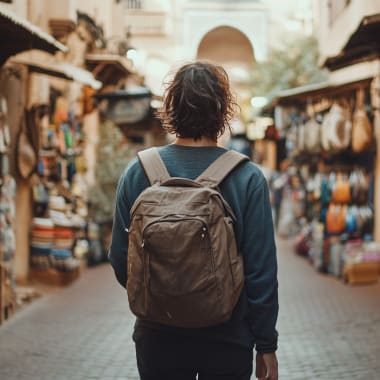
Entry requirements for Morocco
Start your vacation well prepared – with the most important information on entry to Morocco
Start your vacation well prepared – with the most important information on entry to Morocco
Morocco delights with oriental flair, vibrant souks, and fascinating landscapes – but before the journey begins, you should definitely familiarize yourself with the applicable entry regulations. Those arriving without valid travel documents or with incomplete documents risk unnecessary costs, delays, or in the worst case, denial of entry. Especially when traveling with children, bringing certain items, or making last-minute changes to official regulations, early information is essential.
In this article, you will find all the important information you need for a smooth entry into Morocco. From valid travel documents to visa requirements and special regulations for families – this overview will help you plan your trip safely and stress-free.
Required travel documents for entry into Morocco
To ensure your trip to Morocco starts without unexpected incidents, it is important to know the applicable regulations regarding travel documents precisely. Morocco does not accept all identification documents commonly used within the EU. Those arriving with the wrong document risk being turned away at the border – which can lead to a costly and frustrating interruption of travel. In the following sections, you will learn which travel documents are required for adults and children and what requirements they must fulfill.
Passport or ID card
For German nationals, the passport is the mandatory document for entry into Morocco. The German ID card is explicitly not recognized. A pass substitute issued by the embassy on-site is also not valid. Those wishing to enter with just the ID card or a substitute document will be turned away at the border and must take a return flight – at their own expense.
Both the regular passport and a temporary passport are accepted, provided they are in flawless condition and valid for at least six months at the time of entry. There should also be enough blank pages in the passport for Moroccan border officials to stamp or affix any necessary visas without issue.
Special travel documents for children
Children also need their own travel document for entry, either in the form of a regular passport or a children's passport. A mere entry in a parent's passport or an older child ID will not be accepted.
For unaccompanied minors or children traveling with only one parent or a non-legal guardian, additional regulations apply. In such cases, a consent letter from the legal guardians in French must be carried. It is also recommended to carry copies of the birth certificate and identification documents of both parents to quickly clarify any possible questions upon entry.
With the right preparation, unpleasant surprises can be avoided – and you can start your trip to Morocco relaxed.
Visa requirement and duration of stay
The question of whether a visa is required for a trip to Morocco is of central importance for many travelers – as different regulations apply depending on nationality. While many visitors from Europe and other countries can enter visa-free, others need a visa that must be applied for in advance. Additionally, the maximum duration of stay without a visa is clearly defined and should not be exceeded to avoid problems during departure or future entries. The following sections provide an overview of visa-free entry options and conditions for extending your stay.
Visa requirement by nationality
For nationals from a total of 65 countries, including all EU countries, the USA, Canada, Australia, Japan, and others, no visa is required if the trip is for tourism or business purposes and the duration of stay does not exceed 90 days. These individuals can enter visa-free with a valid passport.
Travelers from other countries usually require a visa. The visa must either be applied for through the Moroccan consulate or in certain cases online as an electronic visa. Entry without a visa is not permitted in these cases, and the appropriate visa must be available before travel begins.
Maximum duration of stay without a visa
For visa-free stays, a maximum duration of 90 days applies. This period must not be exceeded – an extension is only possible in exceptional cases and with appropriate justification. The application for extension must be submitted before the expiration of the 90 days to the competent immigration police in Morocco. There is no automatic extension.
The following documents are required for the extension, among others:
- A valid passport
- Justification for the extended stay (e.g., personal, business, or health reasons)
- Proof of sufficient financial means
- Possibly a work contract in Morocco
- A current police clearance certificate
The decision is at the discretion of the authorities. Exceeding the permitted duration of stay may result in consequences such as fines, entry bans, or difficulties during departure. Those who plan ahead and get informed can avoid unnecessary stress and legal complications.
Entry with children
When traveling to Morocco with children, special regulations apply that are designed for the safety of minors and should be carefully observed. Depending on whether children are traveling with both parents, only one parent, or alone, different documents are required. Being well prepared here prevents unnecessary delays during entry and ensures a stress-free start to the vacation.
Documents for minors
In principle, children need their own travel document for entry into Morocco – either a passport or a children's passport. Additionally, it is recommended to carry a birth certificate and copies of the identification documents of both parents to quickly clarify any questions from border authorities.
If a child is traveling with only one parent, a consent letter from the other parent should be carried. This document should be written in French and ideally notarized. It is also advisable to have documents such as marriage certificates or proof of guardianship available in cases of differing last names between the child and parents.
Responsible authorities and contact options
If you have questions about entry into Morocco or need assistance in preparation, you should know which authorities are responsible and how to contact them. In this section, you will learn which institutions handle which tasks – and where you can get help for inquiries or in emergencies.
Important authorities and their tasks
Moroccan entry regulations are determined by the Moroccan Ministry of Foreign Affairs. It is the main authority for regulations regarding visa requirements, entry documents, and international agreements. It is advisable for travelers to directly inform themselves about the current status before departure either there or via diplomatic representations.
The Moroccan embassies and consulates, e.g., in Berlin, Frankfurt, or Düsseldorf, provide advice on visa matters and entry questions and are the first point of contact for consular services. They are also responsible for issuing visas (if required).
The national airport authority ONDA (Office National des Aéroports) implements the entry regulations at airports and controls travel documents upon arrival.
On-site, police and border authorities conduct entry checks. They are also points of contact for residence extensions or problems with entry.
The German Embassy in Rabat, on the other hand, is not a Moroccan authority but can provide support to German nationals in emergencies – for example, in the case of lost passports. However, it cannot issue a substitute for passports when entry problems arise due to invalid documents (e.g., ID card instead of passport).
Contact and assistance options
For binding information on entry regulations, it is best to contact the Moroccan Embassy in Berlin or one of the Consulates General directly:
- Embassy of the Kingdom of Morocco in Berlin
Niederwallstraße 39, 10117 Berlin
Tel.: +49 (0)30 206 124 0
E-Mail: kontakt@botschaft-marokko.de
Website: www.botschaft-marokko.de - Consulate General Frankfurt am Main
Ostparkstraße 35, 60385 Frankfurt
Tel.: +49 (0)69 949 459 100
E-Mail: cgm.frankfurt@maec.gov.ma - Consulate General Düsseldorf
Cecilienallee 14, 40474 Düsseldorf
Tel.: +49 (0)211 650 451 0
Further information and consular services such as online appointment scheduling or form requests can be found at: www.consulat.ma/de
In case of urgent problems during travel, contact the local police station or border authorities in Morocco. The German Embassy in Rabat provides assistance in emergencies but is not responsible for Moroccan entry regulations.
Early contact with the right agencies can resolve many uncertainties – ensuring stress-free entry.
Discover the Orient with experts who have explored every corner themselves
Your dream holiday, tailor-made by experts.
We don't just know the Middle East from books, we visit the country several times a year to experience the culture, landscape and people first-hand.
From your first enquiry to your return home, we are there for you personally - by phone, email or WhatsApp, whenever you need us. Our trips are as unique as you are: individually planned and provided with exclusive privileges and high-quality arrangements that will make your trip unforgettable.
Experts for your Orient trip







